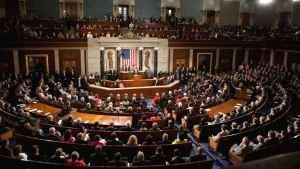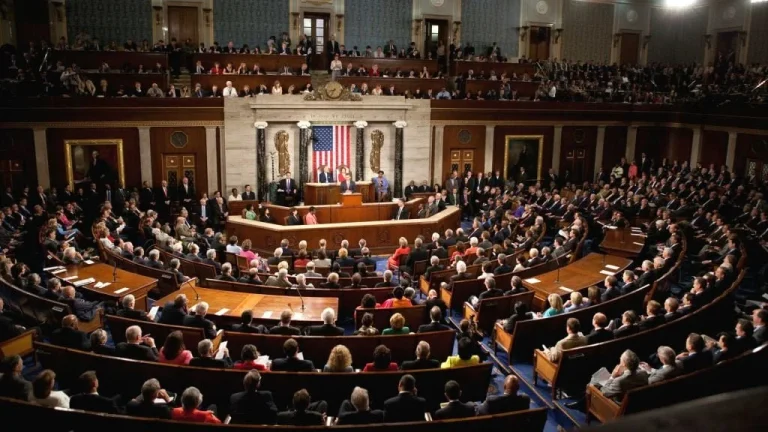In the latest round of congressional budget debates, remarks by Rep. Yassamin Ansari of Arizona have placed the spotlight on a growing divide within Washington over immigration enforcement, government spending priorities, and the looming risk of a federal shutdown. The Democratic lawmaker made her views clear during a televised interview, setting the stage for a clash with Republican leaders who currently control both chambers of Congress and the presidency.
Her comments, which centered on Immigration and Customs Enforcement (ICE) and its place in the federal budget, have already drawn national attention. Ansari’s warning that she will not support a budget that continues to fund what she described as a “rogue agency” signals that negotiations over government funding may become even more complicated than anticipated.
A Televised Statement
On September 8, 2025, Ansari appeared on CNN International’s program The Brief with host Jim Sciutto. During the interview, the freshman lawmaker addressed a recent Supreme Court ruling on immigration enforcement that has sparked heated national debate. The Court’s decision, delivered by a 6-3 majority, allows ICE agents greater latitude when conducting searches, including the ability to consider ethnicity in their assessments of individuals suspected of being in the country unlawfully.
Ansari reacted strongly to the ruling, calling it “another step in complete approval and legalizing Donald Trump and Stephen Miller’s racist agenda.” She argued that the decision would embolden ICE agents and worsen the situation in immigrant-heavy communities. She pointed specifically to her own district in Phoenix, Arizona, where more than 60 languages are spoken and residents come from a wide range of cultural backgrounds.
Against that backdrop, Ansari said she could not in good conscience support a federal budget that continued to increase ICE funding. She claimed that the agency’s resources were “quadrupled in the last budget,” a level of growth she sees as both unnecessary and dangerous.
Government Shutdown on the Horizon?
The remarks gained national traction not just because of their criticism of ICE, but because of the broader implications for federal funding. The government faces another deadline at the end of the fiscal year, and if lawmakers fail to pass a budget, the result would be a shutdown. Such a shutdown would suspend many federal operations, furlough workers, and generate political fallout on both sides.
When pressed by Sciutto about whether Democrats should go along with Republicans to fund the government, as they did in the spring, Ansari was direct. She said that unless Republicans agreed to roll back what she described as “egregious policies,” including Medicaid cuts and the ICE budget increase, she would not support the new spending plan.
Her position underscores the tension between principle and practicality. While Republicans hold the majority, they will still require some Democratic votes to move forward with certain legislative packages. This gives lawmakers like Ansari leverage, though the consequences of using it could be far-reaching.
The Balance of Power
Currently, Republicans control the presidency, the Senate, and the House of Representatives. In theory, this majority provides them with the power to pass a budget on their own. However, the reality of congressional politics often requires cooperation across party lines, particularly in the Senate, where procedural rules can complicate majority rule.
Ansari emphasized that Republicans bear the primary responsibility for ensuring the government remains funded. Still, her statement makes clear that she intends to withhold her own support unless her demands are met. This approach introduces uncertainty into the already fraught budget negotiations.
Broader Political Implications
The debate over ICE is not new, but it continues to divide Democrats. Some within the party argue for reforming the agency rather than eliminating it, focusing on oversight and accountability measures. Others, like Ansari, have gone further, framing ICE as fundamentally flawed and calling for its defunding.
For Republicans, ICE is a core part of their immigration enforcement platform, closely tied to promises made by President Donald Trump during both his campaigns and current administration. Many GOP leaders see any attempt to weaken ICE as unacceptable and politically untenable.
This clash of perspectives makes compromise difficult. If Democrats like Ansari stick to their position, and Republicans remain equally firm, the result could be legislative gridlock leading into a shutdown.
The Supreme Court Ruling’s Role
The timing of Ansari’s comments is significant. The Supreme Court ruling that prompted her response has heightened tensions around immigration policy nationwide. By affirming that ICE can consider ethnicity as a factor in searches, the Court has effectively expanded the agency’s discretion. Supporters of the decision argue that it enhances national security and allows agents to do their jobs more effectively. Critics contend that it legalizes racial profiling and undermines civil rights.
Ansari clearly falls into the latter camp. By linking her opposition to ICE funding with the Court’s decision, she framed the issue as part of a broader struggle against what she describes as systemic discrimination and the normalization of harsh immigration policies.
The View from Arizona
As a representative of Phoenix, Ansari’s comments also reflect the unique demographic reality of her district. Arizona has long been at the center of immigration debates, given its proximity to the U.S.–Mexico border and its diverse population. Her district, in particular, includes large immigrant communities, many of whom feel directly impacted by ICE operations.
By positioning herself as a vocal critic of ICE, Ansari is aligning closely with the concerns of her constituents. At the same time, she risks being painted by opponents as extreme, especially if her stance is linked to the possibility of a government shutdown.
Reactions and Next Steps
The immediate reaction to Ansari’s remarks has been polarized. Supporters argue that she is standing up for immigrant communities and drawing attention to the dangers of unchecked enforcement agencies. Critics accuse her of being reckless by threatening a shutdown at a time when government stability is essential.
Republican leaders, for their part, have signaled no willingness to reduce ICE funding. Instead, they are likely to portray Democrats who oppose it as weak on border security and out of touch with mainstream voters.
The coming weeks will reveal how much influence Ansari’s stance will have. If other Democrats join her in opposing the budget over ICE funding, the pressure on Republican negotiators will increase. If she remains relatively isolated, her comments may be remembered more as a statement of principle than as a decisive factor in budget negotiations.
The Larger Debate
The episode illustrates the broader challenges facing Congress in 2025. With immigration policy once again at the forefront, partisan divisions remain stark. The budget fight is not just about numbers on a page but about fundamental values: how the United States should treat immigrants, what role enforcement agencies should play, and where federal dollars should be spent.
For Ansari, the choice is clear. She views ICE as a threat to her community and believes that refusing to fund the agency is worth the political risk. For Republicans, defunding ICE is a red line they will not cross. This clash sets the stage for a difficult negotiation with no easy resolution in sight.
Conclusion
As the fiscal deadline approaches, Washington faces the possibility of yet another government shutdown. Rep. Yassamin Ansari’s vow to withhold her vote unless ICE funding is removed highlights the growing divide over immigration policy and federal spending. Whether her stance becomes a rallying point for others or remains an isolated position, it underscores the tension between principle and pragmatism in American politics.
The weeks ahead will test the ability of both parties to find common ground—or, failing that, the willingness of lawmakers to accept the consequences of stalemate.

James Jenkins is a celebrated Pulitzer Prize-winning author whose work has reshaped the way readers think about social justice and human rights in America. Raised in Atlanta, Georgia, James grew up in a community that instilled in him both resilience and a strong sense of responsibility toward others. After studying political science and creative writing at Howard University, he worked as a journalist covering civil rights issues before dedicating himself fully to fiction. His novels are known for their sharp, empathetic portraits of marginalized communities and for weaving personal stories with broader political realities. Jenkins’s breakout novel, Shadows of Freedom, won national acclaim for its unflinching look at systemic inequality, while his more recent works explore themes of identity, resilience, and the fight for dignity in the face of oppression. Beyond his novels, James is an active public speaker, lecturing at universities and participating in nonprofit initiatives that support literacy and community empowerment. He believes that storytelling is a way to preserve history and inspire change. When not writing, James enjoys jazz music, mentoring young writers, and traveling with his family to explore cultures and stories around the world.







